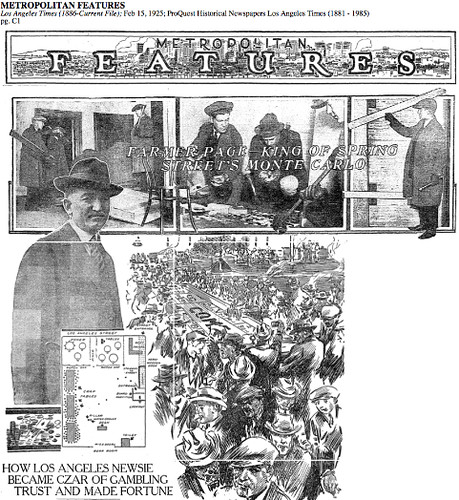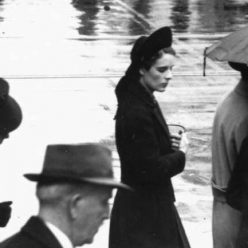What was SROland’s grandest gaming establishment? Milton “Farmer” Page’s El Dorado Club. “Farmer” Page was an unlikely gambling kingpin. His nickname came from “his shambling gait and ill-fitting clothes.” He dropped out of school at age 12. But Page was an enterprising fellow. As a newsboy, he secured the lucrative corner of Second and Spring Streets. There he developed a feel for the dice. Younger brother Stanley, a famous jockey, got “Farmer” off the street and made him his personal valet, but Page just took his dice and card games to the tracks. In 1917, he moved back to Los Angeles and opened a game in the basement of the old Del Monte bar on West Third Street. He soon gained a reputation as an “honest gambler.” By 1918, he had five gambling clubs. He was now ready for the big-time — the El Dorado Club. Occupying the entire top floor of a Spring Street office building, the El Dorado had a great run, hosting hundreds of devotees of poker, black jack, and dice games. Crowds of 500 or 600 people a night were common. When the police felt obliged to raid the aforementioned establishment, 15-20 “house men” would step forward to be arrested. Page would later bail them out of Central Police Station. Three months was a typical run, after which time Page would let the police shut things down and then move to another location.
But by early 1925, things looked bad for Mr. Page. He’d shot a man, in self defense, but the cops were watching him. Customers stopped coming. Now, murmur the “wise ones on Spring Street” the gambling trust is broken. But have no doubt, they say: a new combine will inevitably rise to replace it… We’ll see more of Mr. Page and such confreres as “Zeke” Caress, Bob Sherwood, Guy McAfee, Albert Marco, and Charles Crawford, as well as rivals such as Frank and Tony Cornero. We’ll also begin to explore the shadowy entity that controlled the Los Angeles underworld and that in time came to be known as “the Combination.”  Illustration credit: The Los Angeles Times, from the February 15, 1925 article, “Farmer Page—King of Spring Street’s Monte Carlo.”
Illustration credit: The Los Angeles Times, from the February 15, 1925 article, “Farmer Page—King of Spring Street’s Monte Carlo.”

